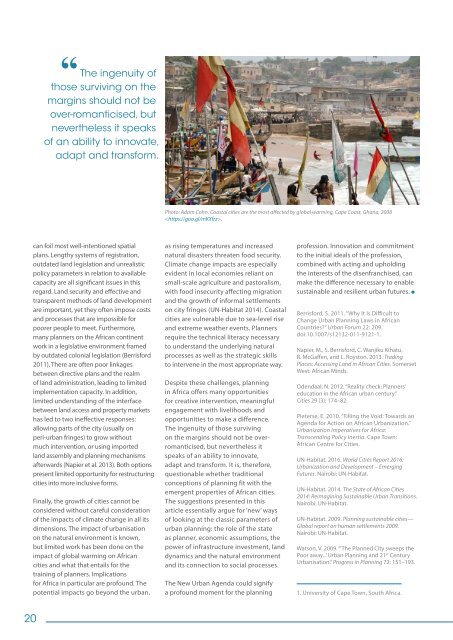A new urban paradigm pathways to sustainable development
PiF37
PiF37
Create successful ePaper yourself
Turn your PDF publications into a flip-book with our unique Google optimized e-Paper software.
“<br />
The ingenuity of<br />
those surviving on the<br />
margins should not be<br />
over-romanticised, but<br />
nevertheless it speaks<br />
of an ability <strong>to</strong> innovate,<br />
adapt and transform.<br />
Pho<strong>to</strong>: Adam Cohn. Coastal cities are the most affected by global warming, Cape Coast, Ghana, 2008<br />
.<br />
can foil most well-intentioned spatial<br />
plans. Lengthy systems of registration,<br />
outdated land legislation and unrealistic<br />
policy parameters in relation <strong>to</strong> available<br />
capacity are all significant issues in this<br />
regard. Land security and effective and<br />
transparent methods of land <strong>development</strong><br />
are important, yet they often impose costs<br />
and processes that are impossible for<br />
poorer people <strong>to</strong> meet. Furthermore,<br />
many planners on the African continent<br />
work in a legislative environment framed<br />
by outdated colonial legislation (Berrisford<br />
2011). There are often poor linkages<br />
between directive plans and the realm<br />
of land administration, leading <strong>to</strong> limited<br />
implementation capacity. In addition,<br />
limited understanding of the interface<br />
between land access and property markets<br />
has led <strong>to</strong> two ineffective responses:<br />
allowing parts of the city (usually on<br />
peri-<strong>urban</strong> fringes) <strong>to</strong> grow without<br />
much intervention, or using imported<br />
land assembly and planning mechanisms<br />
afterwards (Napier et al. 2013). Both options<br />
present limited opportunity for restructuring<br />
cities in<strong>to</strong> more inclusive forms.<br />
Finally, the growth of cities cannot be<br />
considered without careful consideration<br />
of the impacts of climate change in all its<br />
dimensions. The impact of <strong>urban</strong>isation<br />
on the natural environment is known,<br />
but limited work has been done on the<br />
impact of global warming on African<br />
cities and what that entails for the<br />
training of planners. Implications<br />
for Africa in particular are profound. The<br />
potential impacts go beyond the <strong>urban</strong>,<br />
as rising temperatures and increased<br />
natural disasters threaten food security.<br />
Climate change impacts are especially<br />
evident in local economies reliant on<br />
small-scale agriculture and pas<strong>to</strong>ralism,<br />
with food insecurity affecting migration<br />
and the growth of informal settlements<br />
on city fringes (UN-Habitat 2014). Coastal<br />
cities are vulnerable due <strong>to</strong> sea-level rise<br />
and extreme weather events. Planners<br />
require the technical literacy necessary<br />
<strong>to</strong> understand the underlying natural<br />
processes as well as the strategic skills<br />
<strong>to</strong> intervene in the most appropriate way.<br />
Despite these challenges, planning<br />
in Africa offers many opportunities<br />
for creative intervention, meaningful<br />
engagement with livelihoods and<br />
opportunities <strong>to</strong> make a difference.<br />
The ingenuity of those surviving<br />
on the margins should not be overromanticised,<br />
but nevertheless it<br />
speaks of an ability <strong>to</strong> innovate,<br />
adapt and transform. It is, therefore,<br />
questionable whether traditional<br />
conceptions of planning fit with the<br />
emergent properties of African cities.<br />
The suggestions presented in this<br />
article essentially argue for ‘<strong>new</strong>’ ways<br />
of looking at the classic parameters of<br />
<strong>urban</strong> planning: the role of the state<br />
as planner, economic assumptions, the<br />
power of infrastructure investment, land<br />
dynamics and the natural environment<br />
and its connection <strong>to</strong> social processes.<br />
The New Urban Agenda could signify<br />
a profound moment for the planning<br />
profession. Innovation and commitment<br />
<strong>to</strong> the initial ideals of the profession,<br />
combined with acting and upholding<br />
the interests of the disenfranchised, can<br />
make the difference necessary <strong>to</strong> enable<br />
<strong>sustainable</strong> and resilient <strong>urban</strong> futures.<br />
Berrisford, S. 2011. “Why It Is Difficult <strong>to</strong><br />
Change Urban Planning Laws in African<br />
Countries?” Urban Forum 22: 209.<br />
doi:10.1007/s12132-011-9121-1.<br />
Napier, M., S. Berrisford, C. Wanjiku Kihatu,<br />
R. McGaffen, and L. Roys<strong>to</strong>n. 2013. Trading<br />
Places: Accessing Land in African Cities. Somerset<br />
West: African Minds.<br />
Odendaal, N. 2012. “Reality check: Planners’<br />
education in the African <strong>urban</strong> century.”<br />
Cities 29 (3): 174–82.<br />
Pieterse, E. 2010. “Filling the Void: Towards an<br />
Agenda for Action on African Urbanization.”<br />
Urbanization Imperatives for Africa:<br />
Transcending Policy Inertia. Cape Town:<br />
African Centre for Cities.<br />
UN-Habitat. 2016. World Cities Report 2016:<br />
Urbanization and Development – Emerging<br />
Futures. Nairobi: UN-Habitat.<br />
UN-Habitat. 2014. The State of African Cities<br />
2014: Reimagining Sustainable Urban Transitions.<br />
Nairobi: UN-Habitat.<br />
UN-Habitat. 2009. Planning <strong>sustainable</strong> cities—<br />
Global report on human settlements 2009.<br />
Nairobi: UN-Habitat.<br />
Watson, V. 2009. “‘The Planned City sweeps the<br />
Poor away...’ Urban Planning and 21 st Century<br />
Urbanisation.” Progress in Planning 72: 151–193.<br />
1. University of Cape Town, South Africa.<br />
20


